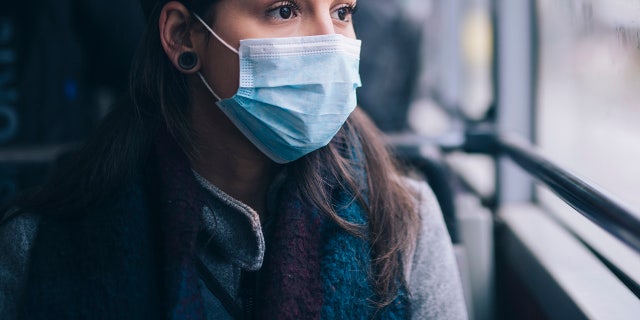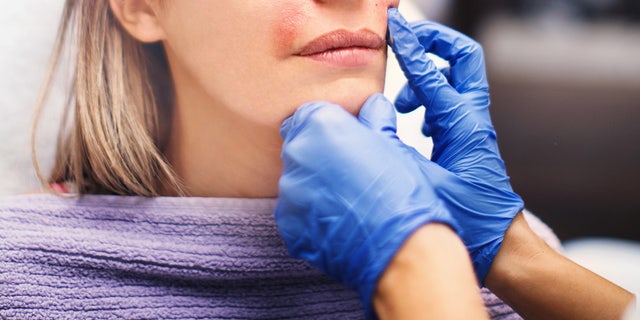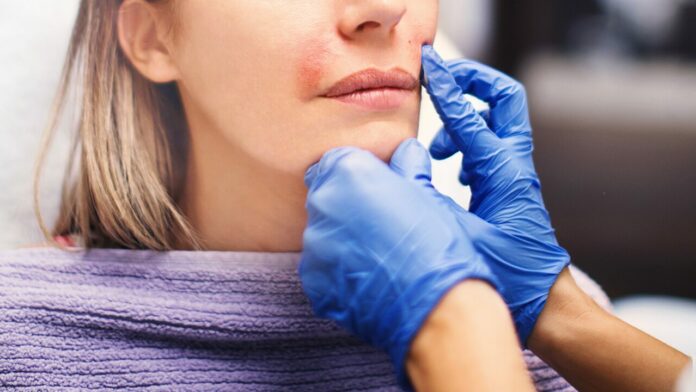Get all the latest news on coronavirus and more delivered daily to your inbox. Sign up here.
If you thought “backne” was the only portmanteau-ready dermatological problem you’d be dealing with in your lifetime, an entirely new cutely-nicknamed skin condition is staring us right in the face.
And it’s right on your face, too.
“Maskne,” or acne that tends to form around the areas of your face covered by protective masks, is becoming more and more common as Americans don protective face coverings in the fight against COVID-19. But that doesn’t mean you have to accept “maskne” as just another irritating facet of life in 2020.
HOW TO SOOTHE DRY, CRACKED HANDS ROUGHENED FROM OVERWASHING
Dr. Samer Jaber, of Washington Square Dermatology in NYC, says that while “maskne” may be more prevalent, there’s no reason not to adopt a few simple practices to keep it from forming in the first place.
“When you wear a mask, you seal in your breath,” says Dr. Jaber on the causes of “maskne” and other related skin conditions. “This creates a moist, humid environment as it traps your breath, skin oils and sweat, leading to irritation, rashes and acne.”
Comparing the phenomenon to diaper rash, Jaber adds that the masks themselves may also irritate skin simply by being in contact with the face for long periods of time. This can possibly exacerbate existing conditions like eczema, psoriasis or rosacea.

Protective face masks prevent the spread of COVID-19, but they’re not preventing breakouts or facial acne, many users say.
(iStock)
“The longer you wear a mask the worse it is, so this is unfortunately very common in health care workers, as they need to wear their masks for long periods of time,” says Dr. Jaber.
CLICK HERE TO SIGN UP FOR OUR LIFESTYLE NEWSLETTER
Masks, meanwhile, are recommended for those who can’t sufficiently social-distance themselves in public settings, and are outright required of the public by some travel providers, retail operators and now at major theme parks. But while masks can be a nuisance, they are sometimes necessary to prevent infecting others. When safely self-isolating, though, Jaber recommends you free up your face.
“If you can safely take off your mask, then take off your mask and let your skin breathe when possible,” Jaber says.
There are a number of other precautions the mask-wearing public should be taking to prevent “maskne,” Jaber recommends washing the face twice daily, with whatever cleanser works best for your skin type, and following with a moisturizer around the areas where the mask usually irritates the skin.
“You can use light lotions, thicker creams, or even ointments like Vaseline depending on how irritated your skin is.”

“If you can safely take off your mask, then take off your mask and let your skin breathe when possible,” says Dr. Samer Jaber of Washington Square Dermatology in NYC.
FOLLOW US ON FACEBOOK FOR MORE FOX LIFESTYLE NEWS
It’s also imperative to let your masks dry out after each wear, and to wash your cloth face coverings regularly “to remove the oils and sweat trapped in it,” Jaber explains.
If things are especially bad, Jaber has one last recommendation: “Don’t wear makeup under your mask.”
Then again, these guidelines are all well and fine for preventing “maskne,” but what if it’s already all over your chin and nose?
“You can try a spot treatment with benzoyl peroxide, salicylic acid or glycolic acid,” says Dr. Jaber, who also said a hydrocortisone cream could help reduce inflammation on irritated areas. ”Just be careful, as your skin in that area will likely be sensitive and topical acne treatments can make this more irritated and even worse.”
CLICK HERE FOR FOX NEWS’ CONTINUING CORONAVIRUS COVERAGE
If all else fails, Dr. Jaber says there are plenty of board-certified dermatologists who can assist via telemedicine visits from the comfort of your home — no masks required.






